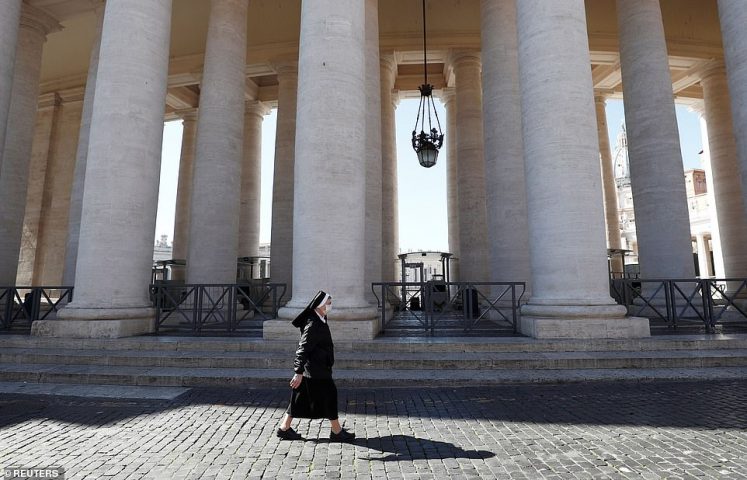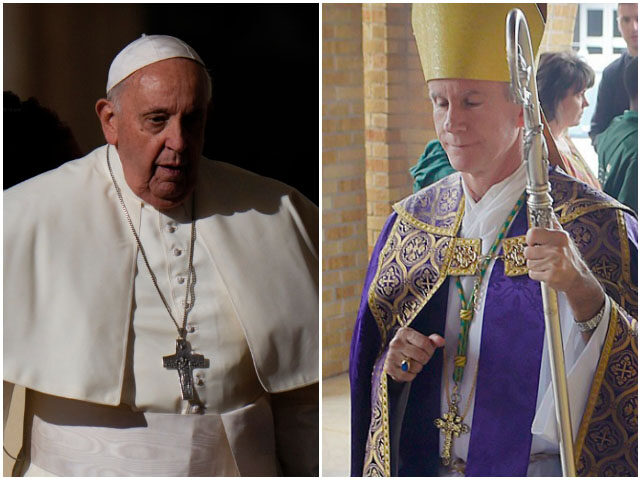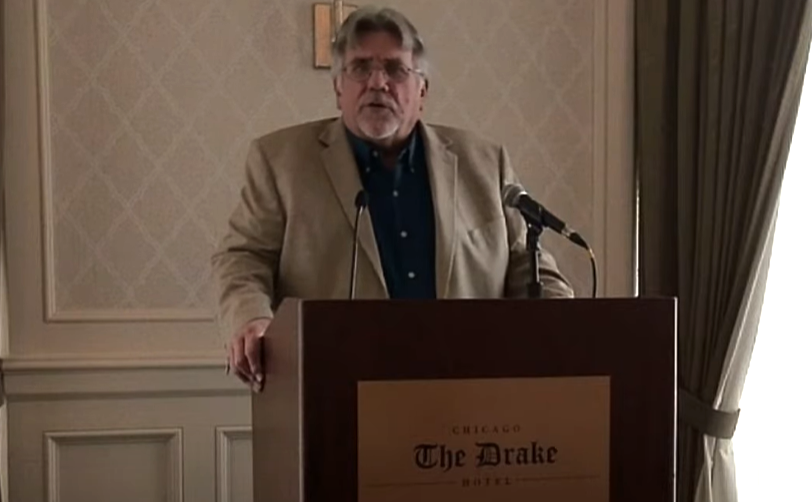Bishop Joseph Strickland: In The Wake Of COVID-19 . . . Time For A New Missionary Age

Bishops Weigh How and When to Resume Public Masses, by Kate Scanlon
April 28, 2020
Aridity And Progress, by Dan Burke
April 28, 2020
A nun wearing a protective face mask walks past the Bernini Colonnade surrounding the closed St. Peter’s Square today. Added by BPS publisher
By Most Rev. Joseph Strickland, The Wanderer, April 27, 2020
(Republished with permission of Mr. Joe Matt, The Wanderer)
I write this article as the COVID-19 Pandemic continues. Hopefully, it is waning in its severity. Yet, in its wake it has presented, for millions, an existential crisis, a time when deep reflection on the meaning of our lives has resurfaced. On Monday April 20, 2020, I read an excellent article in The Catholic Thing by Dr. Robert Royal entitled “The Start of a Reckoning.” Dr. Royal observed:
“A legitimate Christian debate is underway about whether the virus is a ‘chastisement’ for the many sins of the modern world, even in Christian and formerly Christian nations. In the nature of things, we can’t say for sure, unless we receive some message from on high. But whether God sent the plague or has merely permitted it, He must want good things to come from it. And in unexpected ways they already have.”
I truly pray that all of us, during this existential crisis, have been drawn into a deeper prayer life and a protracted examination of conscience. I hope we have begun to question the priorities in our life and rediscovered what really matters most. I hope we have begun to see the new idols of this age and decided we will reject them and turn to the only true and living God.
Things will never be the “same” when this pandemic subsides. And, maybe that is a good thing.
Hunger For God
On the First Sunday of Advent, as bishop of the Diocese of Tyler, Texas, I declared a “Year of the Eucharist: Fostering Reverence for the Real Presence.” My purpose for doing so included my deep concern that many Catholic faithful no longer believed in the Real Presence of Jesus Christ, Body, Blood, Soul and Divinity, in the Most Blessed Sacrament.
Of course, I had no idea that we would face, only months later, a pandemic. A pandemic which has had, as one of its many tragic results, making reception of the Holy Eucharist unavailable to many Catholic faithful. Yet, what I have called a “Eucharistic famine” has had the effect of rekindling a deep hunger in the hearts of Christ’s faithful to once again receive Him in Holy Communion.
I have also found an extraordinary hunger for God being rekindled in many, many people, both within the Church, and beyond. Some who had never considered that there might even be a God, are now open to hearing the Gospel of Jesus Christ, from those who are willing to share that Gospel. People are praying again, with real fervor. People are reading the Sacred Scripture, the Bible, and hungering for more. I am beginning to believe that this horrid Virus has opened a new mission field, for those with eyes to see and hearts to respond.
So, I ask, in the Wake of COVID-19, might we be entering a new missionary age?
The Missionary Mandate
Of course, entering into such a new missionary age requires that we rediscover the missionary mandate of the whole Church. It requires Church leaders, and all the faithful, to insist once again that every person on the Earth not only has the right to hear the Gospel — but needs to come to know Jesus Christ, to be saved by Him, being baptized into His Mystical Body, the Church.
On December 7, 1990, Pope St. John Paul II issued an encyclical letter entitled Mission of the Redeemer (Redemptoris Missio). It needs to be reread in the wake of COVID 19. In fact, his entire Magisterium needs to be reread and form the foundation for such a new missionary age.
Sadly, along with the other elements of doctrinal confusion which have emerged as a result of many, many years of either no catechesis or poor catechesis, too many Catholics, and other Christians, have forgotten that we are all called to be missionaries. Forgotten that the Church is by both nature and vocation, Missionary. That the Church continues in time the Redemptive Mission of Jesus Christ her head. We are all called to preach the Gospel to the whole world. To call the whole world to conversion to Jesus Christ.
In some instances, we are wrongly being told, even by some Church leaders, when we even speak of our missionary vocation, that we should not “proselytize.” Pope St. John Paul II addressed this mistaken use of the word in n. 46 of Mission of the Redeemer. It is worth quoting in its entirety:
“The proclamation of the Word of God has Christian conversion as its aim: a complete and sincere adherence to Christ and his Gospel through faith. Conversion is a gift of God, a work of the Blessed Trinity. It is the Spirit who opens people’s hearts so that they can believe in Christ and ‘confess him’ (cf. 1 Cor. 12:3); of those who draw near to him through faith Jesus says: ‘No one can come to me unless the Father who sent me draws him’ (John 6:44).
“From the outset, conversion is expressed in faith which is total and radical, and which neither limits nor hinders God’s gift. At the same time, it gives rise to a dynamic and lifelong process which demands a continual turning away from ‘life according to the flesh’ to ‘life according to the Spirit’ (cf. Romans 8:3-13). Conversion means accepting, by a personal decision, the saving sovereignty of Christ and becoming his disciple.
“The Church calls all people to this conversion, following the example of John the Baptist, who prepared the way for Christ by ‘preaching a baptism of repentance for the forgiveness of sins’ (Mark 1:4), as well as the example of Christ himself, who ‘after John was arrested…came into Galilee preaching the Gospel of God and saying: “The time is fulfilled, and the kingdom of God is at hand; repent and believe in the Gospel”’ (Mark 1:14-15).
“Nowadays the call to conversion which missionaries address to non-Christians is put into question or passed over in silence. It is seen as an act of ‘proselytizing’; it is claimed that it is enough to help people to become more human or more faithful to their own religion, that it is enough to build communities capable of working for justice, freedom, peace and solidarity.
“What is overlooked is that every person has the right to hear the ‘Good News’ of the God who reveals and gives himself in Christ, so that each one can live out in its fullness his or her proper calling. This lofty reality is expressed in the words of Jesus to the Samaritan woman: ‘If you knew the gift of God,’ and in the unconscious but ardent desire of the woman: ‘Sir, give me this water, that I may not thirst’ (John 4:10, 15).”
We Are Sent Out
In the Gospel of St. Mark, we read this account of the sending of the Twelve on Mission: “Jesus summoned the Twelve and began to send them out two by two and gave them authority over unclean spirits. He instructed them to take nothing for the journey but a walking stick — no food, no sack, no money in their belts.
“They were, however, to wear sandals but not a second tunic. He said to them, ‘Wherever you enter a house, stay there until you leave from there. Whatever place does not welcome you or listen to you, leave there and shake the dust off your feet in testimony against them.’ So they went off and preached repentance. The Twelve drove out many demons, and they anointed with oil many who were sick and cured them” (Mark 6:7-13).
He still sends us “two by two.” We are now the “them” — the ones Jesus sends, for this hour. He still works His saving and redemptive mission in and through us, because we are members of His Mystical Body, the Church. Jesus has not changed the plan. Sadly, too many have simply forgotten or rejected it.
A Right To Hear The Gospel
The Catholic Church has always taught that every single human being on the face of the Earth has a right to hear the liberating Gospel message of Jesus Christ, as fully revealed in the heart of His Catholic Church. That will be accomplished in this hour by you and me, no matter what our state in life, or specific vocation. We are all baptized into Jesus Christ and called to participate in the saving mission of His Church.
However, in order to be able to engage such a missionary task, many Catholic Christians need to be renewed in their own Baptismal faith through a personal and transformative encounter with the Risen Lord. Perhaps that is a part of this “Day of Reckoning”?
In addition, that encounter needs to be strengthened and secured by solid catechesis in living as a Catholic Christian. This is what was meant by the New Evangelization which Pope St. John Paul II called for. I founded the St. Philip Institute of Catechesis and Evangelization in my diocese. The Institute is doing great work toward this end in the Catholic Diocese of Tyler, Texas.
This call to a “New Evangelization” is not about “programs.” It is about encountering the Risen Jesus Christ. It is about inviting each of us to live our baptismal vocation completely given over to the work of the Lord Jesus Christ. It is meant to bring about an authentic renewal and necessary reform of the Church so that she can undertake a new missionary outreach to the whole world. Only a Church fully alive in the Lord and filled with His Spirit can carry out such an evangelical mission.
Some Questions
How many Catholics understand the implications of their own Baptism? How many know what the Catholic Church really teaches? How many truly experience the Church as a mother, or what it means to live in the Church as a communion? How many have come to perceive the Church as “Some-One” rather than some-thing? How many do more than hear the Word of God at Holy Mass? How many read and study it daily?
Yet, it is precisely this kind of living faith, and this robust vision of the Church, which is needed to inform, inspire, and fuel fruitful missionaries. Is it possible? Is this supposed to only be the experience of the mystics, the talk of the saints and fathers? Or, is it supposed to be the truly common experience of every Christian? The answer is clear; it is supposed to be the common experience of all Christians. That includes you and me.
In Catholic theology we teach what the early fathers, saints, and councils throughout the ages have all affirmed; to belong to Jesus is to belong to His Body, the Church. Our membership in the Church is a participation in the life of God; what the Apostle Peter referred to as a “participation in the Divine nature” (2 Peter 1:4). Through our Baptism the Church becomes our home, the privileged place in which we live our lives in Christ. To perceive, receive, and to live this requires continuing conversion.
In its treatment of the Church, the Catechism of the Catholic Church states: “To reunite all his children, scattered, and led astray by sin, the Father willed to call the whole of humanity together into his Son’s Church. The Church is the place where humanity must rediscover its unity and salvation. The Church is ‘the world reconciled.’ She is that bark which ‘in the full sail of the Lord’s cross, by the breath of the Holy Spirit, navigates safely in this world’” (CCC, n. 845).
Conclusion
Because the Church is both human and divine, her members still sin. Sometimes evil takes root in weak spots and rots her from within. However, the promise of Christ is still reliable: “And I tell you, you are Peter, and on this rock, I will build my church, and the powers of death shall not prevail against it” (Matt. 16:18). To the Church has been entrusted the sacraments and the Word, the gift of a teaching office and the very means of salvation for all men and women.
The Church is not an optional extra that we add to our lives; she is our life. We live in Christ for the sake of the world. From the Lord’s wounded side, she was birthed at the tree of Calvary, the altar of the new world. She is the seed of the Kingdom to come and makes that Kingdom present in a world waiting to be reborn.
I believe we are at the beginning of a great resurgence in the Catholic Church precisely for this new missionary age. Just when her opponents are ready to count the Catholic Church out, the sleeping giant is rising. Along with the needed purification of the Church, the seeds of a new missionary age can begin to sprout. I know it’s hard to see them. But they are just below the surface.
For example, the lay ecclesial movements are flourishing; new and renewed religious communities are growing and new and renewed colleges and universities, desirous of being fully and faithfully Catholic, are sending out missionaries into every segment of the fields of this hour, which are ripe for harvest. There is a growing dynamically orthodox Catholic faith and life being manifested among the lay faithful.
The movement of growing number of other Christians coming home to the full communion of the Catholic Church, the movement toward the healing of the division between East and West, are all signs of a resurgent Catholic Church at the dawn of a new missionary age.
The Lord who birthed the Church from His wounded side on Golgotha’s Hill and died for her is purifying her and renewing her by His Spirit to continue His redemptive work until He returns to bring it to completion. He has been raised from the dead and walks now with our feet.
In the wake COVID-19, it is time for a New Missionary Age. Remember, we are all missionaries. He still sends us out two by two — and equips us with all we need to continue His mission. The fields are ripe, ready for Harvest.




